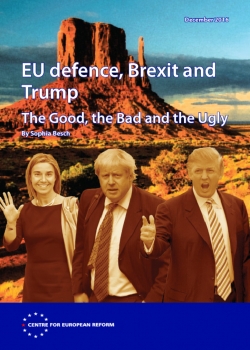
EU defence, Brexit and Trump: The Good, the Bad and the Ugly
At the European Council in December 2016, EU leaders will discuss a new set of initiatives to strengthen the EU’s common security and defence policy (CSDP).
The Brexit referendum and the election of Donald Trump have spurred EU leaders to boost their support for European defence. They recognise that they need to increase their share of the burden of European security and rely less on the United States; and they want to reassert the Union’s credibility after Britain’s vote of no confidence.
With #Brexit &Trump, #EUdefence has been given a boost but sustaining the momentum will be difficult
In response to Trump’s critical comments about NATO during the US election campaign, European leaders are likely to increase their military spending. And post-Brexit, the EU may be able to unfreeze some of the defence initiatives – such as an EU military headquarters – that the UK has vetoed in the past.
Even if the EU puts more resources into defence, Trump and the Brexit referendum will damage European security. Europeans will wonder whether they can rely on the US security guarantee; and with Brexit the EU will lose one of the strongest European militaries, as well as the main proponent of making the EU’s defence market more competitive.
Both the EU-27 and Britain have an interest in keeping the UK involved in the EU’s military operations and its defence market. But the bad feelings over Brexit negotiations on both sides of the channel, and euroscepticism in the UK, could make it difficult to establish a privileged partnership between the two.
Trump is right to criticise Europeans for not carrying their weight on defence spending #EUdefence
France and Germany are the obvious countries to take the lead in European defence, to ensure that the current momentum for Mogherini’s plans is sustained beyond the December Council. But Paris and Berlin have very different visions for CSDP, and both will be distracted by domestic challenges in 2017.
Finally, Trump is right to criticise Europeans for spending too little on their own defence. Only if European capitals translate their recent declarations of political will into a real and sustainable increase in defence spending can the new CSDP proposals succeed.

